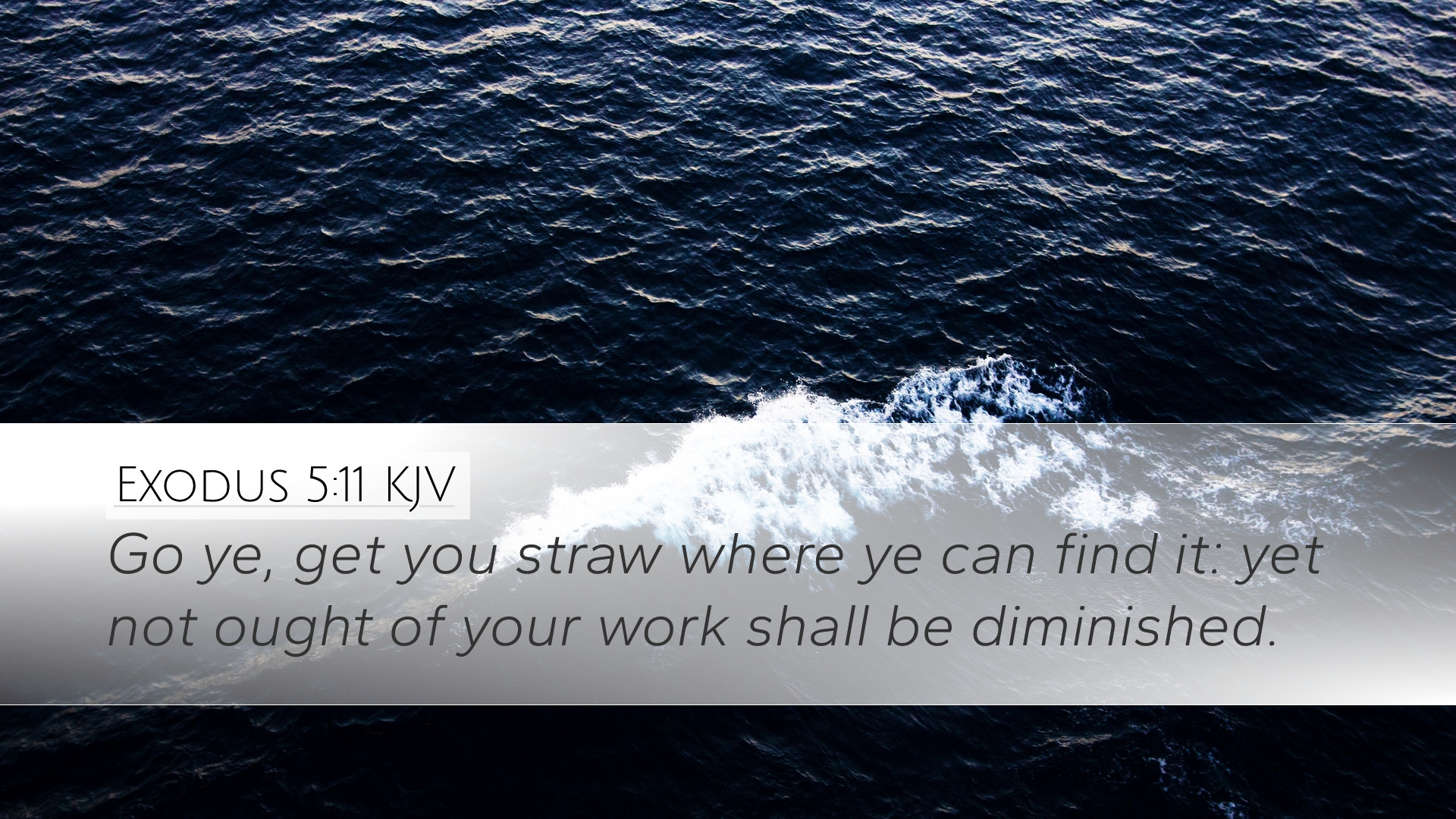Exodus 5:11 - Commentary
Verse: "Go, get you straw where ye can find it: yet not aught of your work shall be diminished."
Contextual Overview
This verse is situated in the early chapters of Exodus, at a pivotal moment when Moses and Aaron confront Pharaoh to demand the release of the Israelites from slavery. Pharaoh responds to their demand with increased oppression, showcasing his hardened heart and unwillingness to liberate the Israelites. This passage illustrates the difficulties faced by God’s people and sets the stage for the subsequent display of God’s power.
Commentary Insights
Matthew Henry's Commentary
Matthew Henry emphasizes the oppressive nature of Pharaoh's commands and the sheer impossibility of his demands under the circumstances. He notes that the Israelites are required to maintain their quota of bricks without the necessary materials, highlighting Pharaoh’s cruelty and disregard for the lives of the Hebrew people. Henry suggests that this scene reflects the stubbornness of sin, as Pharaoh refuses to acknowledge the divine authority that Moses represents. Furthermore, Henry points out that this trial serves to strengthen the faith of the Israelites, as they learn to rely on God amidst their suffering.
Albert Barnes' Commentary
Albert Barnes offers insight into the logistics of the situation. He observes that the Egyptians were accustomed to providing straw for the brick-making process, which was essential for construction material. By denying the Israelites straw while expecting them to fulfill the same productivity standards, Pharaoh's decree signals an escalation of their suffering. Barnes argues that this act was more than a mere increase in labor; it symbolized a breaking point in the Israelites’ bondage. He highlights that God often allows His people to experience trials to ultimately reveal His glory and power in deliverance.
Adam Clarke's Commentary
Adam Clarke provides a nuanced interpretation regarding the significance of straw in Egyptian brick-making. He comments on the practical difficulties the Israelites faced as their labor conditions worsened. Clarke suggests that Pharaoh’s response reflects a deeper symbolic meaning of divine justice—wherein the oppressor's arrogance leads to their own downfall. The command to seek straw elsewhere conveys the notion that the Israelites' situation would only worsen before they ultimately receive liberation. His analysis brings forth a theological understanding of the delay in God’s promises being realized, compelling the faithful to trust in divine timing.
Theological Reflections
This verse provides rich material for theological reflection, particularly concerning themes of suffering, oppression, and divine sovereignty. The oppressive conditions faced by the Israelites evoke the broader narrative of God's people enduring hardships throughout scripture. The struggle and the sustained burden serve as a backdrop for the miraculous works that God performs, underscoring His ultimate deliverance.
Endurance and Faith
- Faith in Trials: Believers are reminded that periods of hardship can strengthen faith. It is in these challenging times that reliance on God deepens.
- God’s Sovereignty: The passage highlights God’s control over circumstances. Even when situations appear dire, God’s purposes are at work behind the scenes.
- Hope in Deliverance: The Israelites’ labor intensifies, yet it foreshadows their deliverance by a mighty hand, illustrating that God’s promises will prevail.
Applications for Today
For contemporary readers, Exodus 5:11 resonates with several core applications. Firstly, the oppression faced by the Israelites can inspire a commitment to justice and advocacy for the marginalized in society. Additionally, this verse encourages individuals who are experiencing personal trials to maintain hope and seek divine assistance, trusting that God is aware of their struggles. It also serves as a reminder that God's plan often unfolds in ways that require patience and perseverance.
Conclusion
Exodus 5:11 is a profound verse that encapsulates the struggle for deliverance faced by the Israelites while highlighting the overarching narrative of hope and divine intervention. Pastors, students, theologians, and Bible scholars can delve into this scripture to explore the intricacies of faith amidst suffering, the sovereignty of God, and the ultimate hope found in God’s promises.


